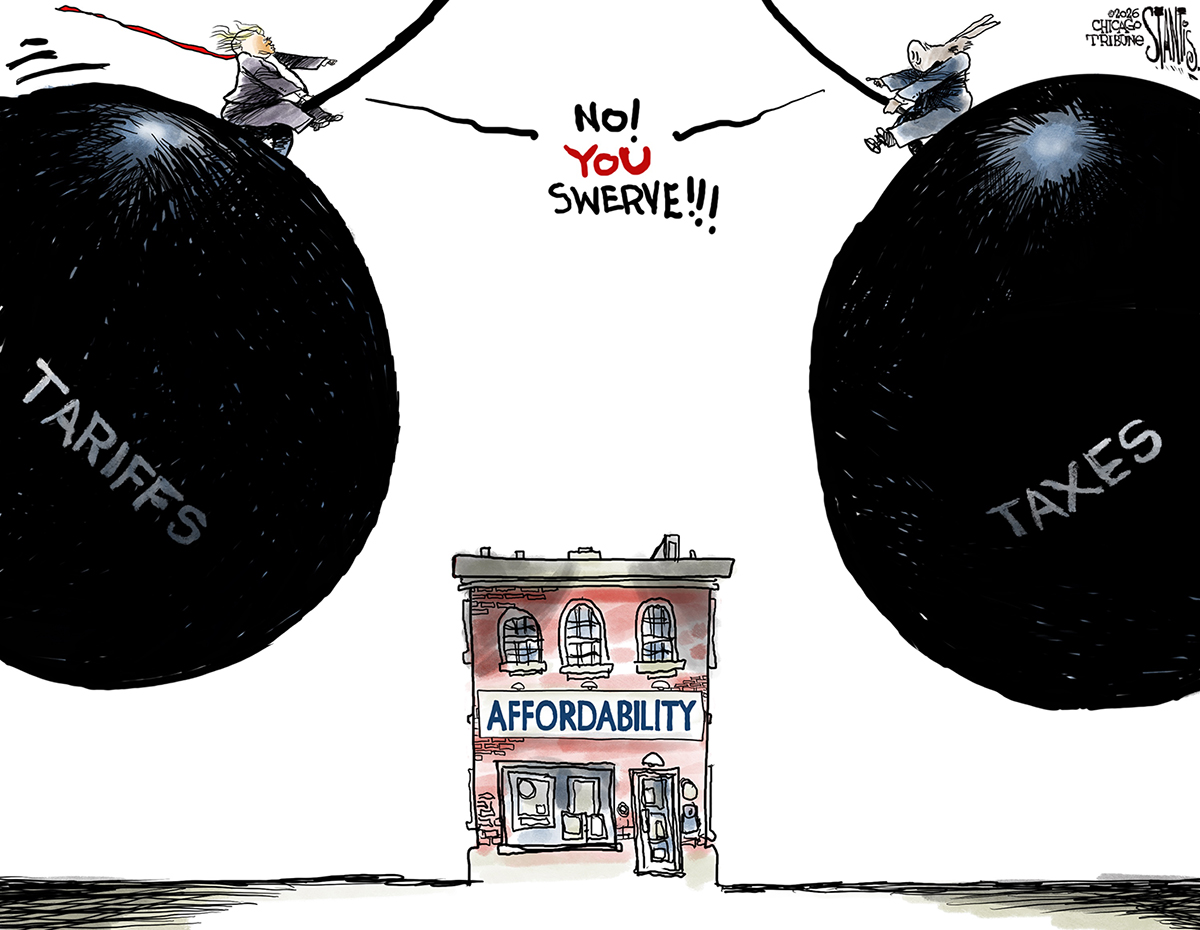How Donald Trump liberated the lunatics
He's all anger, all the way down


Who are these people?
Admit it, even if you're a Republican, you've had that thought watching the Republican National Convention. Maybe it was when Rep. Steve King of Iowa pronounced that whites have contributed more to "civilization" than members of certain unnamed "subgroups." Or maybe it was when a pastor invoked Jesus Christ in leading the convention in a prayer to defeat the "enemy," who is "Hillary Clinton and the Democratic Party."
Or maybe it was when Patricia Smith, the mother of an information management officer killed in the attack on the U.S. embassy in Benghazi, called for Clinton to be thrown in prison. Or when Rudy Giuliani ranted and raved and shrieked his way through a speech devoted to legitimating every paranoid fear about terrorism and the Obama administration's foreign policy ever floated in the fever swamps of the right. Or when Ret. Army Gen. Michael Flynn ranted and raved and shrieked through his own equally unhinged speech denouncing the president he once worked for, while taking momentary pauses to lead cheers of "Lock her up!" about the prospective Democratic nominee for president.
The Week
Escape your echo chamber. Get the facts behind the news, plus analysis from multiple perspectives.

Sign up for The Week's Free Newsletters
From our morning news briefing to a weekly Good News Newsletter, get the best of The Week delivered directly to your inbox.
From our morning news briefing to a weekly Good News Newsletter, get the best of The Week delivered directly to your inbox.
And that was just Night 1 in Cleveland.
Night 2 was packed with obsequious tributes to the now-official nominee — from his family, the president of a mixed martial arts promotion company, a pro golfer, and a soap opera actress. Chris Christie presided over a chilling Salem witch trial of Hillary Clinton that was repeatedly punctuated by chants of "Guilty!" from the crowd. And then Ben Carson linked Clinton to radical community organizer Saul Alinsky and... Lucifer.
Who are these people?
The answer is: They are Republicans.
A free daily email with the biggest news stories of the day – and the best features from TheWeek.com
That may seem obvious. Of course they're Republicans. It's the Republican convention! Yet it's striking how often liberals as well as #NeverTrump conservatives — and even a fair number of establishment and donor-class Republicans who have decided to go along with Donald Trump's coronation for the sake of party unity, hoping things will revert to the status quo ante as soon as the messiness of the present moment has passed — lapse into a story in which Trump and his supporters undertook a hostile takeover of the GOP. That story implies that the unalloyed rage, fearmongering, demonization, and extremism on display in Cleveland somehow comes from outside the party, as if millions of interlopers had wrested control of the GOP away from its rightful leadership through some mix of cunning and electoral brute force.
The truth is at once less dramatic and more disturbing.
Parties are coalitions of factions. The character of the party is determined both by the priorities of the factions included in the coalition and the relative power of each in relation to the others. In the 36 years since Ronald Reagan triumphed over Jimmy Carter, the Republican Party has been ruled by a coalition of three factions — each of which is oriented around a coherent ideology that points in the direction of a cluster of preferred policies:
- Businessmen, financiers, entrepreneurs, and libertarians mainly concerned about cutting taxes and regulations on the wealthy.
- Evangelical Protestants, conservative Catholics, and others mainly concerned about social issues like abortion, same-sex marriage, pornography, and other battles in the culture war.
- Neoconservative policy intellectuals mainly concerned about American hegemony and projecting U.S. military might around the globe.
For 20 years after Reagan's victory, the three factions were roughly equal partners in running the party. By 2000, the coalition started to fray, with the neoconservatives feeling left out of George W. Bush's realist-themed foreign policy vision. The 9/11 attacks greatly amplified the influence of the neocons, leading to a party strongly reunified for the 2004 election. But the coalition frayed again in 2008, with John McCain's otherwise inexplicable choice of Sarah Palin as his running mate serving mainly as an expression of his desire to outsource social-conservative duties to his vice president. (George H. W. Bush had tried something similar with Dan Quayle in 1988.) Things got worse in 2012 when Mitt Romney ran a lopsided campaign in which the business faction of the party wielded greatly disproportionate influence.
Which brings us to the unprecedented turbulence of the present moment.
The three ideological factions that have shared rule for the past 36 years are not the only factions in the party. Going all the way back to the Goldwater campaign of 1964, the GOP has also contained large number of voters who are motivated less by ideas and a specific policy agenda than by anger, resentment, and fear — of communists, liberalism, black civil rights, feminism, Washington bureaucrats and the "administrative state," Mexican immigrants, gays, and Muslim terrorists.
Each of the party's governing factions responds to some concerns of this restive, fearful faction — the business faction takes on liberalism and Washington, neocons promise to smite communists and Islamic terrorists, and the social conservatives have at various times fought against the civil rights movement, feminism, and gay rights. That division of labor has enabled the GOP to achieve harmony for long stretches of time. (Reagan's two terms and the middle years of George W. Bush's presidency were its high-water marks.)
But the era of harmony has now come to an end.
Egged on for years in its anger, fear, and resentments by talk radio and Fox News, provoked as never before by the election of an African-American president who pursued an ambitious liberal agenda at home and abroad, provoked further by Mitt Romney's failure to banish that president after one term, the GOP's angry faction was waiting, hoping for someone to serve as its champion and conduit. (For a few years, politicians and journalists dubbed voters who were primarily motivated by this hope "The Tea Party.")
The ruling factions tried to do what they've always done in response to their angry compatriots: Treat them with respect, and promise to take their concerns into account as they fashion policy and develop a strategy for fighting the agenda of the Democrats. So in both the 2012 and 2016 presidential primaries, candidates representing each of the ideological factions staked out evermore radical positions and defended them in ever-angrier terms. Obama is a socialist out to destroy America. The gay agenda would lead to the end of religious freedom in the United States. "Leading from behind" and the Iran deal are expressions of the president's urge to surrender to our enemies.
Had Donald Trump chosen not to run for president, the party's angry faction would have once again settled unhappily on one of the other options, suspecting (and not without reason) that all the ranting, raving, and shrieking was mainly rhetoric intended to keep the same three ideological factions in ultimate control of the party.
But Trump did run — and for the first time in the party's modern history, the GOP's angriest, most resentful, most fearful voters had a genuine tribune, someone who spoke their language and channeled their unbridled rage without any hesitation. Trump wasn't a member of any of the three ideological factions that have run the show since 1980, and so he didn't use angry rhetoric merely to advance a policy agenda tied to the same old ideological program.
He was all anger, all the way down.
And so the old arrangement collapsed — as the angry Republicans finally declared their independence from the ideologues. Their faction runs the party now — and its style and substance (such as it is) is on vivid display in the Quicken Loans Arena this week. The old ideological factions are there. Paul Ryan's Tuesday speech anachronistically evoking the GOP as the "party of ideas" was their moment in the setting sun. For the rest of the convention, they will be observers, left to contemplate their reduced status in the post-revolutionary order, with some withholding donations and others continuing to dream of mounting a counter-revolution. (Interestingly, the social conservative faction has been most willing to make its peace with the new regime — and the new boss.)
As for the rest of us, we can only watch stunned and appalled as the lunatics consolidate their rule over the asylum.
Damon Linker is a senior correspondent at TheWeek.com. He is also a former contributing editor at The New Republic and the author of The Theocons and The Religious Test.
-
 Political cartoons for January 18
Political cartoons for January 18Cartoons Sunday’s political cartoons include cost of living, endless supply of greed, and more
-
 Exploring ancient forests on three continents
Exploring ancient forests on three continentsThe Week Recommends Reconnecting with historic nature across the world
-
 How oil tankers have been weaponised
How oil tankers have been weaponisedThe Explainer The seizure of a Russian tanker in the Atlantic last week has drawn attention to the country’s clandestine shipping network
-
 The billionaires’ wealth tax: a catastrophe for California?
The billionaires’ wealth tax: a catastrophe for California?Talking Point Peter Thiel and Larry Page preparing to change state residency
-
 Bari Weiss’ ‘60 Minutes’ scandal is about more than one report
Bari Weiss’ ‘60 Minutes’ scandal is about more than one reportIN THE SPOTLIGHT By blocking an approved segment on a controversial prison holding US deportees in El Salvador, the editor-in-chief of CBS News has become the main story
-
 Has Zohran Mamdani shown the Democrats how to win again?
Has Zohran Mamdani shown the Democrats how to win again?Today’s Big Question New York City mayoral election touted as victory for left-wing populists but moderate centrist wins elsewhere present more complex path for Democratic Party
-
 Millions turn out for anti-Trump ‘No Kings’ rallies
Millions turn out for anti-Trump ‘No Kings’ ralliesSpeed Read An estimated 7 million people participated, 2 million more than at the first ‘No Kings’ protest in June
-
 Ghislaine Maxwell: angling for a Trump pardon
Ghislaine Maxwell: angling for a Trump pardonTalking Point Convicted sex trafficker's testimony could shed new light on president's links to Jeffrey Epstein
-
 The last words and final moments of 40 presidents
The last words and final moments of 40 presidentsThe Explainer Some are eloquent quotes worthy of the holders of the highest office in the nation, and others... aren't
-
 The JFK files: the truth at last?
The JFK files: the truth at last?In The Spotlight More than 64,000 previously classified documents relating the 1963 assassination of John F. Kennedy have been released by the Trump administration
-
 'Seriously, not literally': how should the world take Donald Trump?
'Seriously, not literally': how should the world take Donald Trump?Today's big question White House rhetoric and reality look likely to become increasingly blurred
